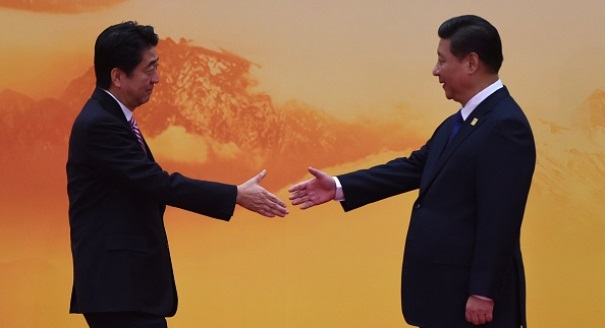Every week, a selection of leading experts answer a new question from Judy Dempsey on the foreign and security policy challenges shaping Europe’s role in the world.
Fraser CameronDirector of the EU-Asia Centre
Given the EU’s trade and investment with the region, the union obviously has a major stake in a peaceful, stable Northeast Asia, and hence, the rapprochement between Japan and China is to be welcomed.
President Park Geun-hye of South Korea has talked up the EU’s possible contribution to the region, but the reality of all great power relationships is that states do not want any outside actor telling them how to run their affairs. This goes for all countries in Asia, especially the EU’s four strategic partners—China, Japan, India, and South Korea.
The EU's priority in East #Asia should be to help strengthen #ASEAN.
The EU’s priority should be to help strengthen the ten-member Association of Southeast Asian Nations (ASEAN), which is seeking to establish an economic community by the end of 2015. Here, the EU’s experience is valid, although it will always be up to the ASEAN members to decide what, if anything, they learn from the EU.
Most Europeans underestimate the continuing impact of the European imperial legacy in Asia. All relations, whether with individual countries or with regional groupings, will succeed only if the EU ensures that the name of the game is partnership.
François GodementNonresident senior associate in Carnegie’s Asia Program and director of the Asia and China Program at the European Council on Foreign Relations
A respite in the Sino-Japanese quarrel will be very welcome from the European point of view. The EU has taken positions in support of regional stability, a peaceful resolution of disputes, and even Japan’s proactive diplomacy. The union has carefully avoided directly criticizing China, however, and tries not to get involved in the many bilateral sovereignty disputes in the East and South China Seas.
A respite in the Sino-Japanese quarrel will be very welcome for Europe.
European economic relations with China have become a topic of paramount importance, with their own difficulties. At the same time, several big EU member states are major security providers to Japan, South Korea, Malaysia, Singapore, India, and Australia, although these countries are often not bound by a formal defense treaty.
The aftermath of the November 10 meeting between Japanese Prime Minister Shinzō Abe and Chinese President Xi Jinping, and of previous meetings between Chinese and Japanese diplomats, deserves to be watched carefully. China has gained Japan’s recognition that there is a territorial quarrel between the two nations, even if this recognition is couched in the principle of “we agree to disagree” rather than presented as a formal acknowledgment.
Will China exercise more restraint in its challenge to Japanese sovereignty over contested areas such as the Senkaku/Diaoyu Islands? For Beijing to desist makes sense only if such a step is the start of negotiations aimed at resolving the disagreement. Otherwise, China weakens its long-term case. Abe and his government have moved responsibly and pragmatically. But if there is no forward movement from both sides, the dispute might be rekindled on the ground at any time.
Maaike Okano-HeijmansSenior research fellow at the Clingendael Institute
A pragmatic EU bureaucrat with a long-term strategic vision for East Asia and a shrewd European businessman would say: yes, Europe should care. Because, honestly speaking, Europeans can actually gain from a certain level of discord—although not outright conflict—between the world’s second- and third-biggest economies.
Europe can gain from a certain level of discord in East #Asia.
After all, managed conflict between Beijing and Tokyo has certain benefits for the EU, its member states, and European businesses. Just consider the idea of less competition from Japanese companies in China, or the opportunity for Europe to gain diplomatically from playing China off against Japan in negotiations on trade and investment issues, the environment, or values. This is pragmatic diplomacy and mercantile realism—as both China and Japan practice so well themselves.
Probably more reflective of today’s Europe, however, is the standard answer. Yes, Europe should care about the Chinese-Japanese rapprochement because Europeans are advocates of peace and stability. And because unrest in the fast-growing East Asian region in general and between the EU’s first and second trading partners in Asia in particular is not conducive to business activity and the stock markets.
The second viewpoint may be the ideal, model answer. But as the Asia-Pacific region continues to grow in economic and political relevance, and with Europe still at a significant strategic distance, a bit more shrewd pragmatism would be a welcome change.
James SchoffSenior associate in Carnegie’s Asia Program
The recent meeting between Japanese Prime Minister Shinzō Abe and Chinese President Xi Jinping in Beijing is welcome, but it will likely be a short-lived respite from jockeying over disputed islands given the leaders’ reluctance to compromise on substance. There are short-term and long-term reasons why this matters to Europe.
The meeting between #Abe and #Xi will likely be a short-lived respite.
The near-term impact is economic. Strained Japan-China ties have depressed bilateral trade volume and help explain a 40 percent drop in Japanese foreign direct investment in China in the first half of 2014. This exacerbates weak economic performance in Northeast Asia that makes it harder for Europe to expand exports to (and attract investment from) this vital region.
The longer-term impact is strategic. Japan is not willing to accommodate China’s rise on Beijing’s terms, and both sides see the East China Sea island dispute as a litmus test for Asia’s future power balance. Japan seeks a regional rules-based order that preserves an influential role for itself and the United States, while China aims to regain its preeminent position in Asia.
Prolonged Japan-China confrontation pulls the United States (Japan’s ally) into more direct strategic competition with China, which makes it difficult to address global challenges such as climate change, managing Arctic sea-lanes, nuclear proliferation, and a variety of issues of concern to Europe.
Stephen SzaboExecutive director of the Transatlantic Academy
East Asia seems far away from Europe, but a Sino-Japanese conflict would endanger Europe’s commercial interests in the region. Europe depends on open maritime routes for trade, access to natural resources, and production chains. Germany in particular is vulnerable to disorder in this region. A Europe that is facing continued economic stagnation cannot afford further economic dislocations.
European leaders should urge #Japan to deescalate the situation.
While Europe is vulnerable, there is little it can do to ease tensions between China and Japan. With the exception of Germany, Europe is not a major diplomatic player in the region. Europe has some influence with Japan, however, and should make its concerns clear to Tokyo. European leaders should urge the Japanese government to take a more accommodating position and to deescalate the situation.









